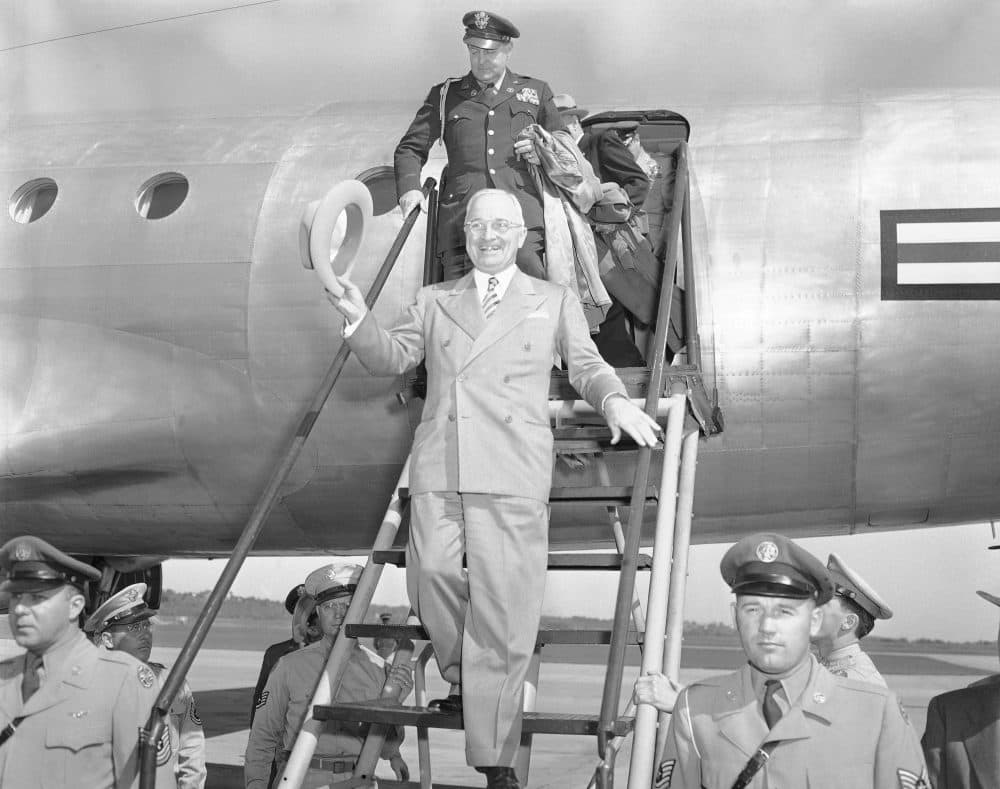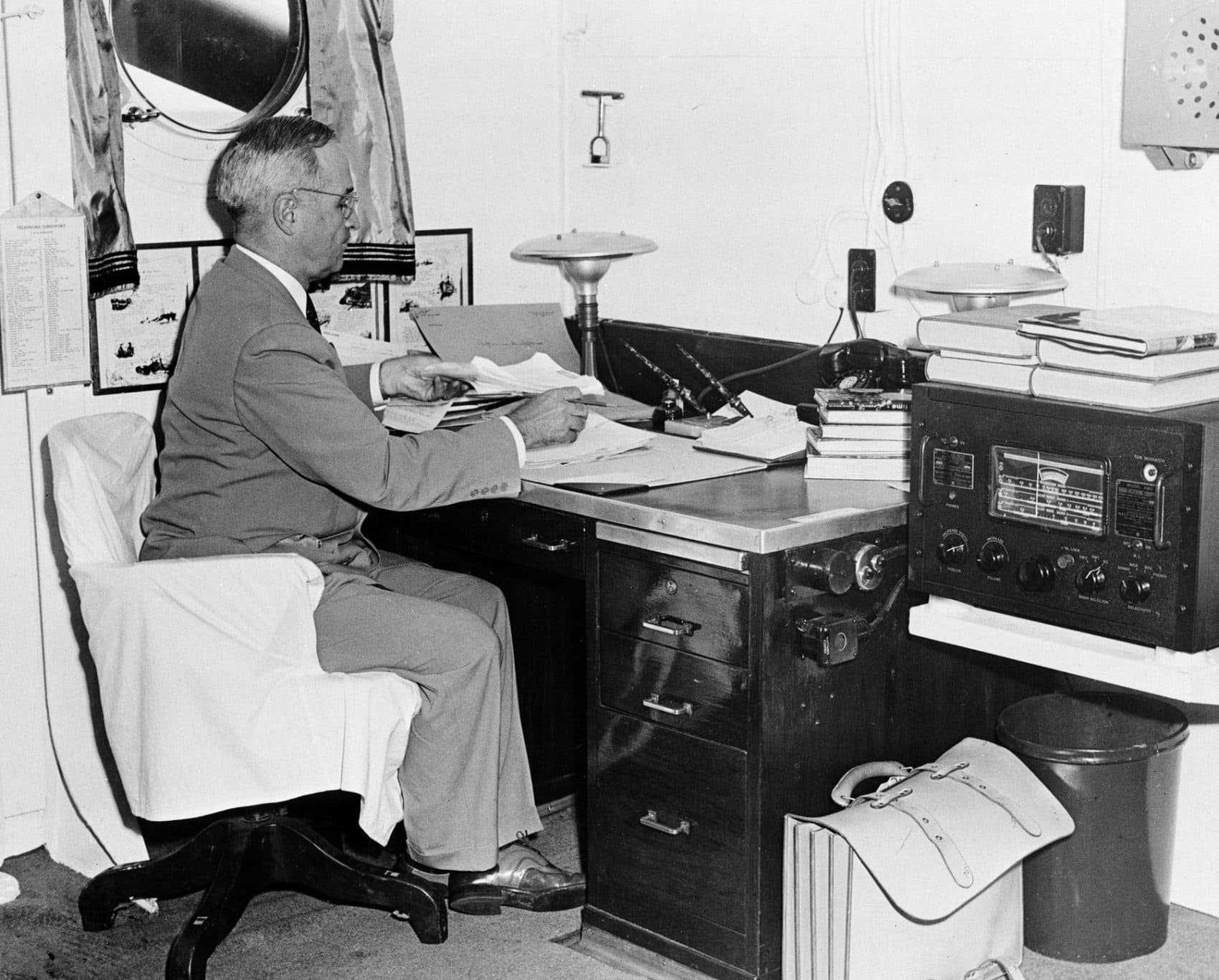Advertisement
At A Presidential Library, Lessons From Truman For Trump
Resume
Here & Now's Jeremy Hobson (@jeremyhobson) makes a trip to the Harry S. Truman Presidential Library and Museum in Independence, Mo. The 33rd president is remembered for dropping atomic bombs on Japan to end World War II, but his legacy is rich and it offers lessons to the man in the White House today.
Interview Highlights: Library And Museum Director Kurt Graham
On why Truman didn't keep furniture in front of the Oval Office fireplace
"The reason for that is because he used this as a press briefing room as well. He brought the entire press corps into the Oval Office. He referred to them as 'boys,' because they were all men, and 'You boys come on in.' He would bring them into the Oval Office, and he would make an announcement or, you know, read a statement or take questions. And they would climb up on the furniture to get the right photograph and everything. It was a much more casual use of the office than you would expect today."
On Truman's personality
"He answered to the people very directly. I sometimes refer to Harry Truman as the Will Rogers of the American presidency. He had these earthy, pithy quotes and little one-liners, often very agrarian in their origins because he was a farmer from Missouri. And he very much had that kind of approach, and he didn't shy away from questions you know, and he didn't shy away from decisions. He made major decisions throughout his administration and he didn't seem to be bothered by the fact that people would be second-guessing him."
On the iconic "The Buck Stops Here" sign he had
"It was on his desk here in this Oval Office. We don't know that it was ever on his desk in the real Oval Office in Washington. It was something given to him later. But, it does — I think it stuck to Harry Truman because it represents both his decisiveness and the number of important decisions that he had to make, but it also, I think, is a reflection of his character. Instead of blaming someone else, instead of trying to look for, you know, a reason that it's not your fault — it's, you know, somebody else's responsible for something — Truman said, 'No, the buck stops here. I take full responsibility.' And he did, for his decisions. He absolutely did."

On whether the atomic bombs are the main part of his legacy
"Well, I guess if you look at it in terms of the amount of material has been written about that decision it could easily rank as that. Truman did not see that as a major part of his legacy. He started his presidency, and within four months, those bombs were dropped and the war was over. And then he had, you know, basically two terms to fill full of all kinds of legislation, all kinds of interesting things going on. So Truman, the interesting thing about Harry Truman is he made a lot of very important decisions, but he didn't second-guess himself. He didn't lose a lot of sleep. He didn't wring his hands over those kinds of things. He made his decisions and he moved on."
On his decision to bring the U.S. into the Korean War
"Very costly decision from the standpoint of popularity. He leaves office in 1953 with some of the lowest poll ratings — I think it was 32 percent — of any modern president. But it was a very courageous thing. He did that to support the United Nations, for one thing. It was not an American war. It was something done under the banner of the United Nations."
On opening the United Nations
"It was something that — obviously, Roosevelt had things underway. One of the first decisions he made as president. And they ask him, 'Should we continue this thing in San Francisco with the United Nations?' And Harry Truman said 'absolutely' and he went to the United Nations and opened it and gave a big speech there, so he was very committed to the idea of the international community."
"He made major decisions throughout his administration and he didn't seem to be bothered by the fact that people would be second-guessing him."
Kurt Graham, director of the Truman Presidential Library and Museum
On his legacy in domestic policy
"Well, Truman was someone who was, I believe, way ahead of his time in a number of issues. Civil rights, for example. You know, when you think of civil rights you automatically think of Lyndon Johnson. But it's interesting that Lyndon Johnson gave a lot of credit to Harry Truman. Here at the library we have a tape of Johnson calling Harry and Bess Truman on Christmas morning 1968, and he tells them that he's been given a plaque of all the legislative accomplishments, by his staff, of things that had happened during his administration. And he says, you know, about half of those things happened under the Truman administration, or got started under the Truman administration. Whether it's Medicare or Medicaid, you know, the idea of end of universal health coverage, there's so many things that Truman does that you look back and you realize that he was way ahead of any kind of civil rights movement or anything that would later come."
On how Missouri is important to his legacy
"Oh, it's very important. It was incredibly important to him. I think being a man from Missouri, being someone who really came up from the bottom. I mean, he was truly a self-made man. He couldn't afford to go to college. He went broke in various businesses. I mean, he did not have the advantage that you would think that someone who had arrived to be president of the United States would have. He's one of the last presidents that you can look to who really sort of came up through the ranks by his own effort and on his own merit."
On what Truman would think of President Trump
"Historians tend to look at change over time. And you know the Trump presidency is still current events. You know, we often quip when we get that question. We say, 'Well anything Harry Truman would say about the current president we probably couldn't repeat on the air, you know, because Mr. Truman had colorful language.' But no, I think time will tell. You know, again, Harry Truman is the one that brought America out of isolationism, the idea that the United States is in a leadership position vis a vis the free world. It seems that we could be retreating from some of that. Whether that's a good thing or a bad thing, you're going to have to get 25 or 30 years beyond the moment and look back and see.
"One of the interesting things that makes this such a fascinating time to be in the Truman business is so much of what Mr. Truman put in place, together with Churchill and other leaders, seems to be up for grabs in a way that it never has been before. But, here at this library, I've had ambassadors from places like Korea, from places like Eastern Europe, come here and say that Harry Truman deserves credit for putting in place the architecture, the structure, the scaffolding, that has held up a system of unprecedented peace and prosperity, not just for the peoples of America and Western Europe, but for the entire world. So when you see that being questioned, when you see a retreat from that or you see that being dismantled, I mean, you do sort of pause and you wonder, 'Well, what is the next thing? Is this the wise thing to be doing or is it not?' And again only time will tell."
This article was originally published on October 25, 2017.
This segment aired on October 25, 2017.
